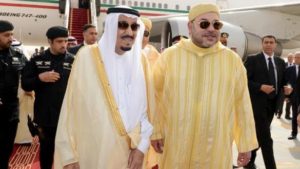 The Sahara issue will probably be one of the main topics to be discussed by King Mohammed VI and the leaders of the Arab Gulf countries at the first Morocco-GCC summit, held in Riyadh, Wednesday April 20.
The Sahara issue will probably be one of the main topics to be discussed by King Mohammed VI and the leaders of the Arab Gulf countries at the first Morocco-GCC summit, held in Riyadh, Wednesday April 20.
On the Sahara issue, which is a stumbling block in relations between Morocco and Algeria, the Gulf States have always demonstrated a staunch support to their Moroccan ally in North Africa. This stance was reaffirmed again on April 7 in Manama, at a meeting between the foreign ministers of the Gulf Cooperation Council member states and US Secretary of State John Kerry.
The foreign ministers of the Gulf Cooperation Council (Saudi Arabia, UAE, Qatar, Kuwait, Bahrain and Oman) had insisted at the meeting with their American peer on the need to support the autonomy plan proposed by Morocco to put an end to the regional conflict over the Sahara. The Moroccan proposal is widely supported internationally but is rejected by Algeria, which backs the separatist Polisario movement.
Besides the Sahara issue, King Mohammed VI’s discussions with the GCC leaders will also focus on military and security matters. As a major ally of the Gulf countries, Morocco is participating in the Saudi-led Arab coalition in Yemen seeking to restore power to the Yemeni legitimate President Abd Rabbo Mansour Hadi.
Morocco also stands steadfastly at the side of the Gulf countries in the framework of the Arab common defense force, dedicated to the fight against terrorism and against threats to partition the region.
At the economic level, Morocco and the GCC countries rely on their close relations to boost further their strategic partnership, a short-term perspective, since the Gulf States are stepping up their direct investments abroad, assessed at some $3,500 billion.
Morocco, which boasts favorable regulations for foreign investments, hopes to drain some of these funds.
In 2014, FDI flows from the GCC countries to Morocco reached €1 billion, up 82% from 2013.